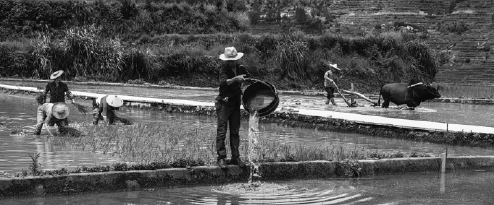Qingtian sees net gain from revived farming technique

HANGZHOU-In 2007, Jin Yuepin made a life-changing decision. He came back to the county of Qingtian in East China's Zhejiang province, after spending 28 years in France.
"When I came back in 2007, I was shocked by the vast, desolate fields in my village and decided to do something," says Jin.
Jin and some other overseas returnees decided to dip their toes into the unfamiliar water of cultivating Qingtian field-grown carp on the idle farmlands.
Raising carp in the fields is a tradition that has more than 1,200 years of history in Qingtian. In the past, local farmers in Qingtian put baby carp in the rice fields, where bugs and plankton were natural prey for the fish. Meanwhile, the fish helped rid the fields of bugs while loosening the soil.
This symbiosis even won recognition from the Food and Agriculture Organization of the United Nations, as it was identified as a globally important agricultural heritage system in 2005.
But Jin's first venture turned out to be a complete failure.
"We failed in the beginning because we didn't have much experience as overseas returnees," he says, adding that in the first three years of the failed cultivation, they lost more than 4 million yuan ($565,347).
But Jin is not one to give up easily.
Jin concluded from the failures that the traditional cultivation methods he inherited from the older generations may not always apply in a modern context.
"In the past, farmers didn't care much about how many fish survived because they only needed to meet their own demand, but we must ensure a decent survival rate for our business," he says.
To overcome the challenge, Jin attended a university in Shanghai in 2011 to learn about modern fish cultivation.
"Those failures taught me a good lesson. After studying, I managed to grasp the scientific knowledge needed," he says. "We integrated old nuggets of wisdom with modern knowledge and eventually succeeded."
While maintaining traditional fish raising methods, Jin and his partners paid more attention to controlling the water quality and hydrogen levels to improve the survival rate of the carp.
In 2011, Jin and local farmers jointly established a rural cooperative, involving more people in the fish business. They are currently enjoying their success, Jin says.
Meanwhile, a local study base has been established, allowing students from home and abroad to experience the distinctive culture in Qingtian.
Jin says he hopes to promote the symbiotic relationship between rice and fish so that more people will learn about and understand the cultural heritage.
Jin says he regularly shows the changes in his hometown to his overseas family members and friends via livestreams or video calls.
"We plan to bring more young people to Qingtian to help develop our hometown," he says.
Xinhua

Today's Top News
- China suspends part of control measures on dual-use items export to US
- Andy Palmer: West can learn from China's long-term planning
- Mainland spokesman reiterates stand on Taiwan
- Xi to attend opening ceremony of National Games, declare Games open
- Xi urges deepening reform, opening-up during Guangdong inspection tour
- China releases white paper on low-carbon development






























